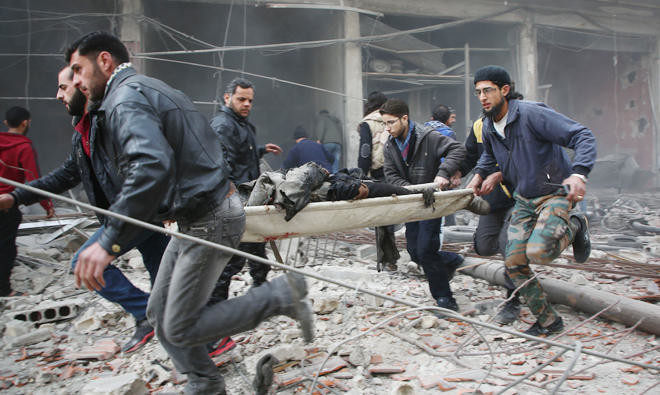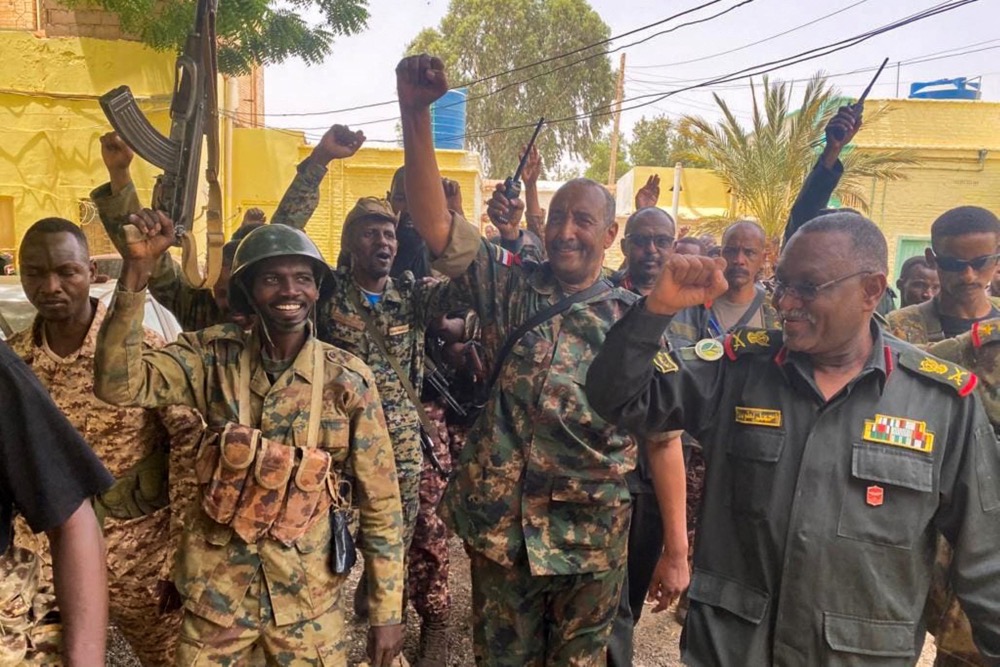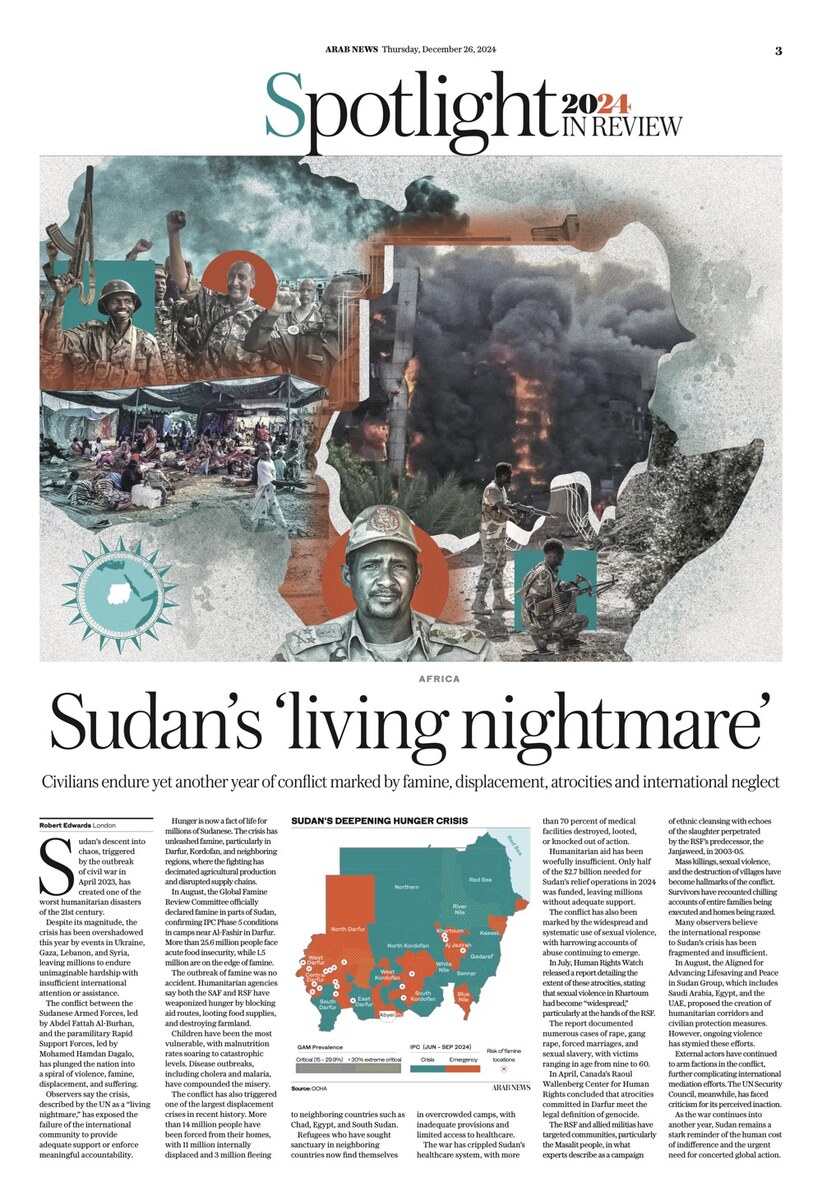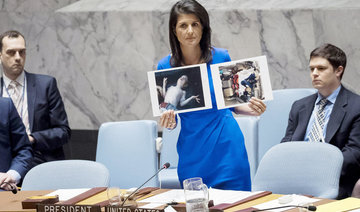BEIRUT: The UN called on Tuesday for an immediate humanitarian cease-fire in Syria of at least a month, as heavy airstrikes were reported to have killed dozens of people in the last major rebel stronghold near Damascus.
Separately, UN war crimes experts said they were investigating multiple reports of bombs allegedly containing chlorine gas being used against civilians in the opposition-held towns of Saraqeb in the northwesterly province of Idlib and Douma in the Eastern Ghouta suburbs of Damascus.
The Syrian regime denies using chemical weapons.
The Syrian Observatory for Human Rights said Tuesday’s bombardment of Eastern Ghouta had killed at least 41 people. A local official, Khalil Aybour, put the toll at 53.
On Monday, airstrikes killed 30 people in Eastern Ghouta, the Observatory said.
“Today there is no safe area at all. This is a key point people should know: There is no safe space,” Siraj Mahmoud, the head of the Civil Defense rescue service in opposition-held rural Damascus, told Reuters.
“Right now, we have people under rubble, the targeting is ongoing, warplanes on residential neighborhoods.”
Insurgent shelling of regime-held Damascus killed three people, the Observatory and Syrian state media reported.
Airstrikes also killed at least six people in opposition-held Idlib including five in the village of Tarmala, the Observatory said.
UN officials in Syria called for hostilities to cease to enable humanitarian aid deliveries and the evacuation of the sick and wounded, listing seven areas of concern including northern Syria’s Kurdish-led Afrin region, being targeted by a Turkish offensive.
Syrian President Bashar Assad, helped by Iranian-backed militias and the Russian air force, is pursuing military campaigns against insurgents in the last major pockets of territory held by his opponents in western Syria.
Ghouta and Idlib
There were airstrikes on towns across the Eastern Ghouta, including Douma, where an entire building was brought down, a local witness said.
The UN representatives noted that Eastern Ghouta had not received inter-agency aid since November.
“Meanwhile, fighting and retaliatory shelling from all parties are impacting civilians in this region and Damascus, causing scores of deaths and injuries,” said their statement, released before the latest casualty tolls emerged on Tuesday.
Paulo Pinheiro, head of the International Commission of Inquiry on Syria, said the government siege of Eastern Ghouta featured “the international crimes of indiscriminate bombardment and deliberate starvation of the civilian population.”
Reports of airstrikes hitting at least three hospitals in the past 48 hours “make a mockery of so-called de-escalation zones,” Pinheiro said, referring to a Russian-led truce deal for opposition-held territory, which has failed to stop fighting there.
France’s Foreign Ministry said it was concerned by the reports of chlorine being used on civilians in Syria, but that it was too soon to confirm them.
French President Emmanuel Macron last May that “any use of chemical weapons would result in reprisals and an immediate riposte, at least where France is concerned.”
The conflict has been further complicated since January by a major offensive that neighboring Turkey launched against the Kurdish YPG militia in Afrin.
UN demands Syria cease-fire as airstrikes pound opposition areas
UN demands Syria cease-fire as airstrikes pound opposition areas

At least 10 killed in Israeli strikes on Gaza, medics say

At least 10 people were killed and more than a dozen wounded in Israeli strikes on Gaza early on Thursday, medics with the Gaza health authorities said.
Five people were killed and 20 wounded in an Israeli airstrike on a house in Gaza City’s Zeitoun neighborhood, the medics reported. They warned the death toll could rise as many remained trapped under the rubble.
In a separate incident, five journalists were killed when their vehicle was struck in the vicinity of Al-Awda hospital in Nuseirat in central Gaza, the enclave’s health authorities said. The journalists worked for the Al-Quds Al-Youm television channel.
Palestinian media and local reporters said the vehicle was marked as a media van and was used by journalists to report from inside the hospital and Nuseirat camp.
There was no immediate Israeli comment on the reported strikes.
On Wednesday, Palestinian militant group Hamas and Israel traded blame over their failure to conclude a ceasefire agreement despite progress reported by both sides in past days.
Clashes between Islamists now in power in Syria and Assad’s supporters kill 6 fighters

- Syria’s transition has been surprisingly smooth but it’s only been a few weeks since Assad fled the country and his administration and forces melted away
DAMASCUS, Syria: Clashes between Islamists who took over Syria and supporters of ousted President Bashar Assad’s government killed six Islamic fighters on Wednesday and wounded others, according to a British-based war monitor.
The Syrian Observatory for Human Rights said the fighters were killed while trying to arrest a former official in Assad’s government, accused of issuing execution orders and arbitrary rulings against thousands of prisoners. The fighters were from Hayat Tahrir Al-Sham, or HTS, which led the stunning offensive that toppled Assad earlier this month.
Syria’s transition has been surprisingly smooth but it’s only been a few weeks since Assad fled the country and his administration and forces melted away. The insurgents who ousted Assad are rooted in fundamentalist Islamist ideology, and though they have vowed to create a pluralist system, it isn’t clear how or whether they plan to share power.
Since Assad’s fall, dozens of Syrians have been killed in acts of revenge, according to activists and monitors, the vast majority of them from the minority Alawite community, an offshoot of Shiite Islam that Assad belongs to.
In the capital, Damascus, Alawite protesters scuffled with Sunni counter-protesters and gunshots were heard. The Associated Press could not confirm details of the shooting.
Alawite protests also took place along the coast of Syria, in the city of Homs and the Hama countryside. Some called for the release of soldiers from the former Syrian army now imprisoned by the HTS. At least one protester was killed and five were wounded in Homs by HTS forces suppressing the demonstration, said the Syrian Observatory. In response to the protests, HTS imposed a curfew from 6 p.m. until 8am.
The Alawite protests were apparently in part sparked by an online video showing the burning of an Alawite shrine. The interim authorities insisted the video was old and not a recent incident.
Sectarian violence has erupted in bursts since Assad’s ouster but nothing close to the level feared after nearly 14 years of civil war that killed an estimated half-million people. The war fractured Syria, creating millions of refugees and displacing tens of thousands throughout the country.
This week, some Syrians who were forcibly displaced, started trickling home, trying to rebuild their lives. Shocked by the devastation, many found that little remains of their houses.
In the northwestern Idlib region, residents were repairing shops and sealing damaged windows on Tuesday, trying to bring back a sense of normalcy.
The city of Idlib and much of the surrounding province has for years been under control of the HTS, led by Ahmad Al-Sharaa, formerly known as Abu Mohammed Al-Golani, once aligned with Al-Qaeda, but has been the scene of relentless attacks by the government forces.
Hajjah Zakia Daemessaid, who was forcibly displaced during the war, said coming back to her house in the Idlib countryside was bitter-sweet.
“My husband and I spent 43 years of hard work saving money to build our home, only to find that all of it has gone to waste,” said the 62-year-old.
In the dusty neighborhoods, cars drove by with luggage strapped on top. People stood idly on the streets or sat in empty coffee shops.
In Damascus, Syria’s new authorities raided warehouses on Wednesday, confiscating drugs such as Captagon and cannabis, used by Assad’s forces. A million Captagon pills and hundreds of kilograms (pounds) of cannabis were set ablaze, the interim authorities said.
Turkiye warns Kurdish militia in Syria ‘will be buried’ if they do not lay down arms

- Following Assad’s departure, Ankara has repeatedly insisted that the Kurdish YPG militia must disband, asserting that the group has no place in Syria’s future
ANKARA: Turkish President Tayyip Erdogan said on Wednesday that Kurdish militants in Syria will either lay down their weapons or “be buried,” amid hostilities between Turkiye-backed Syrian fighters and the militants since the fall of Bashar Assad this month.
Following Assad’s departure, Ankara has repeatedly insisted that the Kurdish YPG militia must disband, asserting that the group has no place in Syria’s future. The change in Syria’s leadership has left the country’s main Kurdish factions on the back foot.
“The separatist murderers will either bid farewell to their weapons, or they will be buried in Syrian lands along with their weapons,” Erdogan told lawmakers from his ruling AK Party in parliament.
“We will eradicate the terrorist organization that is trying to weave a wall of blood between us and our Kurdish siblings,” he added.
Turkiye views the Kurdish YPG militia — the main component of the US-allied Syrian Democratic Forces — as an extension of the outlawed Kurdistan Workers Party militia, known as the PKK, which has waged an insurgency against the Turkish state since 1984.
The PKK is designated a terrorist organization by Turkiye, the US and the European Union. Ankara has repeatedly called on its NATO ally Washington and others to stop supporting the YPG.
Earlier, Turkiye’s Defense Ministry said the armed forces had killed 21 YPG-PKK militants in northern Syria and Iraq.
Israeli airstrike in Bekaa shakes ceasefire 29 days after it came into effect

- The Israeli army claimed that “an Israeli fighter jet attacked a terrorist cell in the Bekaa”
BEIRUT: For the first time since the ceasefire between Israel and Hezbollah came into effect on Nov. 27, Israel breached the agreement deep inside Lebanese territory.
In the early hours of Wednesday, an Israeli warplane struck the town of Taraya near Baalbek.
A Lebanese security source said the airstrike occurred at 2:45 a.m., targeting a residence and an associated garage in the town of Taraya owned by a member of the Hamieh family. There were no casualties.
The Israeli army claimed that “an Israeli fighter jet attacked a terrorist cell in the Bekaa.”
Taraya is on the eastern slopes of the western Lebanese mountains, approximately 73 kilometers from the capital city of Beirut and 23 kilometers from the city of Baalbek. It was previously targeted by Israeli airstrikes during the extensive war on Lebanon — which lasted for 64 days — under the pretext of targeting sites and weapon depots belonging to Hezbollah.
Israel’s continued flouting of the terms of the ceasefire, which has been in effect for 29 days, were the focal point of a meeting held on Tuesday evening between caretaker Prime Minister Najib Mikati and representatives from the United States, France, and the UN Interim Force in Lebanon.
The attendees included American Maj. Gen. Jasper Jeffers, France’s Gen. Guillaume Ponchin, the commander of the Southern Litani sector of the Lebanese Army, Brig. Gen. Edgar Lowndes, and UNIFIL Commander Maj. Gen. Aroldo Lazaro, along with the Lebanese army commander, Brig. Gen. Joseph Aoun.
Mikati called on the committee to “stop the Israeli violations and the immediate withdrawal of Israeli forces from the border areas.”
He also agreed with the attendees to hold successive meetings with the Lebanese army to discuss the issues raised.
Israeli reconnaissance planes resumed incursions into Lebanese airspace, flying at low altitude over southern Lebanon, Beirut and its southern suburbs, after ceasing operations for two days.
On Wednesday, the Israeli army raised Israeli flags at a vacant Lebanese army post on Awida Hill.
This site, a strategic location, is where the Lebanese army previously established a base. It is adjacent to the villages of Kfar Kila, Adaisseh, Deir Mimas and Taybeh and overlooks Israeli settlements in Galilee, including Kiryat Shmona and Hula Valley, extending to Tiberias and deep into the Golan Heights.
Israeli raids on the border village of Taybeh killed two people on Monday.
The Israeli forces that invaded several border villages in southern Lebanon demolished houses and bulldozed roads on the outskirts of Houla, adjacent to Mays Al-Jabal. Lebanese residents are still denied entry to the occupied area, which includes 62 villages.
Israeli artillery shelling on Wednesday targeted Tayr Harfa, the outskirts of Majdal Zoun, and Maroun Al-Ras. Israeli forces also struck Jebbayn, firing bursts of machine-gun fire toward the town.
Media reports in Beirut reported that “US envoy Amos Hochstein will visit Beirut at the beginning of next year to help implement the ceasefire agreement in Lebanon.”
Israeli forces have dragged their heels in the withdrawal from invaded border areas, delaying the Lebanese army’s deployment in the cleared area.
Fears grow that Israeli’s war against Lebanon may restart, because the committee overseeing the implementation of the ceasefire is unable to stop Israeli violations.
The Israeli army is using the 60-day period in the ceasefire agreement for the complete withdrawal of its troops from invaded areas to destroy what is left of Hezbollah’s positions and weapon depots.
Meanwhile, explosions were heard in the Anti-Lebanon mountains separating Lebanon and Syria, apparently caused by the Lebanese army detonating explosive remnants of Israeli operations against Bekaa.
2024 Year in Review: Conflict keeps Sudanese trapped in a nightmare without end

- Famine now blights swathes of the country, while mass atrocities have taken place in Darfur and other regions
- Sudan remains a stark reminder of the human cost of indifference and the urgent need for concerted global action
LONDON: Sudan’s descent into chaos, triggered by the outbreak of civil war in April 2023, has created one of the worst humanitarian disasters of the 21st century.
Despite its magnitude, the crisis has been overshadowed this year by events in Ukraine, Gaza, Lebanon, and Syria, leaving millions to endure unimaginable hardship with insufficient international attention or assistance.
The conflict between the Sudanese Armed Forces, led by Abdel Fattah Al-Burhan, and the paramilitary Rapid Support Forces, led by Mohamed Hamdan Dagalo, has plunged the nation into a spiral of violence, famine, displacement, and suffering.
Over the course of 2024, tens of thousands of people have been killed and millions forced from their homes. Famine now blights swathes of the country, while mass atrocities have taken place in Darfur and other regions.
Essential services, including hospitals, have collapsed, leaving the population dependent on overstretched and underfunded humanitarian aid.

Observers say the crisis, described by the UN as a “living nightmare,” has exposed the failure of the international community to provide adequate support or enforce meaningful accountability.
Hunger is now a fact of life for millions of Sudanese. The crisis has unleashed famine, particularly in Darfur, Kordofan, and neighboring regions, where the fighting has decimated agricultural production and disrupted supply chains.
In August, the Global Famine Review Committee officially declared famine in parts of Sudan, confirming IPC Phase 5 conditions in camps near Al-Fashir in Darfur. More than 25.6 million people face acute food insecurity, while 1.5 million are on the edge of famine.
The outbreak of famine was no accident. Humanitarian agencies say both the SAF and RSF have weaponized hunger by blocking aid routes, looting food supplies, and destroying farmland.
The deliberate targeting of humanitarian convoys has left isolated communities without access to food or clean water, exacerbating the crisis. Children have been the most vulnerable, with malnutrition rates soaring to catastrophic levels in displacement camps.
Malnutrition weakens immune systems, making the population more susceptible to illness. Disease outbreaks, including cholera and malaria, have compounded the misery.
Relief efforts, hampered by funding gaps and logistical challenges, have failed to match the scale of need. Despite repeated warnings from aid organizations, donor pledges have fallen short, leaving millions at risk of starvation.

The conflict has also triggered one of the largest displacement crises in recent history. More than 14 million people have been forced from their homes, with 11 million internally displaced and 3 million fleeing to neighboring countries such as Chad, Egypt, and South Sudan.
Khartoum, once the vibrant capital of Sudan, has become an epicenter of displacement. Entire neighborhoods lie in ruins, and millions of internally displaced persons now live in makeshift shelters, enduring appalling conditions.
Refugees who have sought sanctuary in neighboring countries now find themselves in overcrowded camps, with inadequate provisions and limited access to healthcare.
Host countries, already grappling with their own economic and security challenges, have received insufficient international support to meet the growing needs of these vulnerable populations.
The plight of IDPs is compounded by continued violence. Armed groups frequently attack camps, looting supplies and preying on displaced families. Meanwhile, humanitarian organizations face immense challenges in reaching those most in need.
Millions of people lack access to basic necessities such as food, water, medicine, and fuel. The war has crippled the country’s healthcare system, with more than 70 percent of medical facilities destroyed, looted, or knocked out of action.
Humanitarian aid, though vital, has been woefully insufficient. Only half of the $2.7 billion needed for Sudan’s relief operations in 2024 was funded, leaving millions without adequate support.

Aid agencies say the SAF and RSF have systematically obstructed deliveries of relief, targeting warehouses and convoys in an attempt to starve opposition strongholds into submission. As such, despite the efforts of aid workers, the scale of suffering continues to grow.
The toll of Sudan’s civil war is staggering, with estimates indicating more than 150,000 civilians killed since the conflict began in April 2023. These deaths, caused by bombardments, massacres, starvation, and disease, underscore the catastrophic human cost of the war.
A November report by the London School of Hygiene & Tropical Medicine estimated more than 61,000 deaths in Khartoum state alone between April 2023 and June 2024.
Medical professionals warned early on that official figures underrepresented the true death toll, as many victims could not access hospitals due to ongoing violence.
In a May US Senate hearing, experts suggested the real casualty figure could be 10 to 15 times higher than earlier estimates.
The appalling extent of the violence plaguing Sudan emerged in October and November amid a spate of massacres in eastern Al-Jazirah state. As of December, up to 7,000 civilians had been killed in a series of brutal attacks reportedly carried out by the RSF, according to local monitors.
Survivors recounted harrowing tales of mass rape, forced displacements, and homes set ablaze. These atrocities are part of a broader pattern of violence that has characterized the conflict across Sudan.
Ethnic and territorial motives have driven these attacks, particularly in non-Arab communities. The RSF has been accused of systematic killings, sexual violence, and the destruction of entire villages in Darfur and other regions.
International condemnation of the massacres has been swift but largely ineffective. Human rights organizations have called for accountability and protection for civilians, but the lack of a functional justice system in Sudan has allowed perpetrators to act with impunity.
The conflict has also been marked by the widespread and systematic use of sexual violence, with harrowing accounts of abuse continuing to emerge.

In July, Human Rights Watch released a report detailing the extent of these atrocities, stating that sexual violence in Khartoum had become “widespread,” particularly at the hands of the RSF.
The report documented numerous cases of rape, gang rape, forced marriages, and sexual slavery, with victims ranging in age from nine to 60.
Women and girls, often displaced and vulnerable, have been subjected to unimaginable suffering. NGOs estimate that as many as 4,400 cases of sexual assault may have occurred during the conflict, though the true number is likely much higher.
In April, Canada’s Raoul Wallenberg Center for Human Rights concluded that atrocities committed in Darfur meet the legal definition of genocide.
The RSF and allied militias have targeted communities, particularly the Masalit people, in what experts describe as a campaign of ethnic cleansing with echoes of the slaughter perpetrated by the RSF’s predecessor, the Janjaweed, in 2003-05.
Mass killings, sexual violence, and the destruction of villages have become hallmarks of the conflict. Survivors have recounted chilling accounts of entire families being executed and homes being razed.
The international community has struggled to respond effectively. While some advocacy groups have called for stronger sanctions and international prosecutions, enforcement mechanisms remain weak.
Many observers believe the international response to Sudan’s crisis has been fragmented and insufficient.

The EU imposed sanctions on individuals and entities linked to activities that undermine Sudan’s stability, including those implicated in atrocities. However, these measures have done little to change the behavior of the warring factions.
The US and the African Union have called for a ceasefire, while Saudi Arabia and others have sought to mediate between the parties. However, peace talks have repeatedly failed.
In August, the Aligned for Advancing Lifesaving and Peace in Sudan (ALPS) Group, which includes Saudi Arabia, Egypt, and the UAE, proposed the creation of humanitarian corridors and civilian protection measures. However, ongoing violence has stymied these efforts.
External actors have continued to arm factions in the conflict, further complicating international mediation efforts. The UN Security Council, meanwhile, has faced criticism for its perceived inaction.
As the war continues into another year, Sudan remains a stark reminder of the human cost of indifference and the urgent need for concerted global action.





















